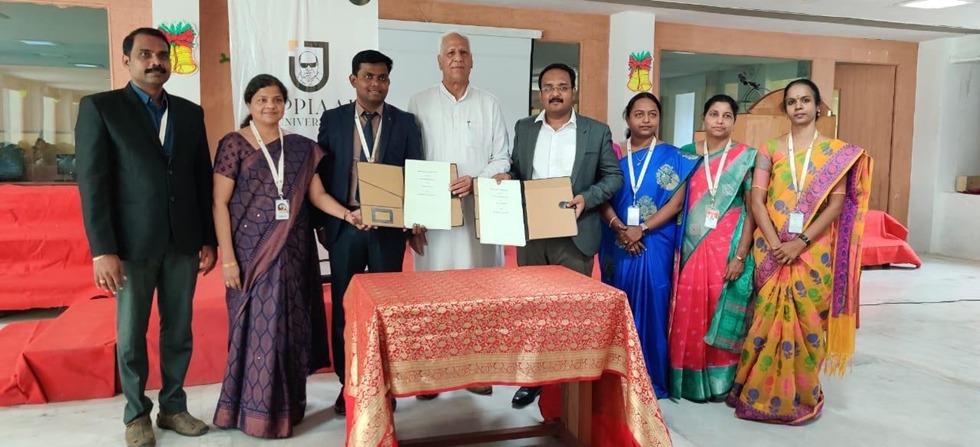Collaboration - School of Arts, Humanities And Management
Collaborative Partnerships and Memorandums of Understanding (MOUS)
Collaborative partnerships and Memorandums of Understanding (MOUs) are essential tools for the School of Arts, Humanities, and Management (or any academic institution) to foster relationships and enhance its educational and research missions. Collaborative partnerships and MOUs are instrumental in advancing the mission of the School of Arts, Humanities, and Management by fostering collaboration, promoting innovation, and enhancing the educational experience for students and faculty alike.
Knowledge Exchange: Collaborative partnerships and MOUs facilitate the exchange of knowledge and expertise between the school and other academic institutions, industry partners, non-profit organizations, and governmental agencies. This exchange can take various forms, including joint research projects, shared resources, and co-teaching opportunities.
Research Collaboration: They enable collaborative research initiatives between faculty members, students, and external partners. By pooling resources and expertise, collaborative partnerships can lead to innovative research projects that address complex societal challenges and advance knowledge in the arts, humanities, and management fields.
Student Opportunities: Collaborative partnerships and MOUs often provide students with unique learning and professional development opportunities. This can include internships, study abroad programs, joint degree programs, and access to industry mentors and guest speakers.
Resource Sharing: Partnerships allow for the sharing of resources such as libraries, laboratories, and specialized equipment. This can help the school expand its capabilities and offer students and faculty access to resources that may not be available internally.
Internationalization: Collaborative partnerships and MOUs with institutions abroad can support the school’s efforts to internationalize its curriculum and provide students with global perspectives. This can include student exchange programs, joint research initiatives, and international conferences and symposiums.
Community Engagement: Partnerships with local community organizations and businesses can strengthen the school’s ties to the surrounding community and provide opportunities for community-based research and service-learning projects.
SAHM signed MOU with Cyber Intelligence Academy on July 2023

Cyber Security
Seminar on Cyber traps and Preventive Measures on Oct 2023
Entrepreneurship Development Cell (EDC) Of Jeppiaar University
The Entrepreneurship Development Cell (EDC) of Jeppiaar University is committed to fostering an entrepreneurial ecosystem within the university community and beyond. The objectivity of the EDC lies in its dedication to promoting entrepreneurship as a viable career path, supporting aspiring entrepreneurs, and cultivating a culture of innovation and enterprise. The key objectives and initiatives undertaken by the EDC are:
Awareness and Education: The EDC aims to raise awareness about entrepreneurship and its potential as a career option among students, faculty, and staff members. It provides educational resources, workshops, seminars, and guest lectures on various aspects of entrepreneurship, including idea generation, business planning, market research, funding options, and risk management.
Skill Development: Through specialized training programs and skill development workshops, the EDC equips aspiring entrepreneurs with the essential competencies and capabilities needed to succeed in the entrepreneurial journey. This includes fostering creativity, critical thinking, problem-solving, communication skills, leadership, and business acumen.
Incubation Support: The EDC offers incubation support to nurture early-stage startups and entrepreneurial ventures. It provides access to infrastructure, resources, mentorship, and networking opportunities to help budding entrepreneurs refine their business ideas, develop prototypes, validate market demand, and scale their ventures.
Networking and Collaboration: The EDC facilitates networking events, industry interactions, and collaboration opportunities to connect aspiring entrepreneurs with experienced mentors, investors, industry experts, and fellow entrepreneurs. These connections enable knowledge sharing, idea exchange, partnership formation, and access to funding and resources.
Business Development Services: Through its network of partners and collaborators, the EDC offers business development services such as legal assistance, financial planning, marketing support, and access to funding sources, including venture capital, angel investors, government grants, and incubation funds.
Entrepreneurial Culture: The EDC endeavors to foster an entrepreneurial culture within the university by celebrating entrepreneurial achievements, showcasing success stories, and recognizing innovative ideas and ventures through awards, competitions, and recognition programs. It encourages a mindset of innovation, risk-taking, resilience, and continuous learning among students, faculty, and alumni.
Community Engagement: The EDC engages with the local community, industry stakeholders, government agencies, and startup ecosystems to promote entrepreneurship, stimulate economic growth, and address societal challenges through innovative solutions. It actively participates in community outreach programs, entrepreneurship awareness campaigns, and social impact initiatives.
Evaluation and Impact Assessment: The EDC conducts regular evaluations and impact assessments to measure the effectiveness of its programs and initiatives. It solicits feedback from stakeholders, tracks the progress of startups and entrepreneurs supported by the EDC, and iteratively improves its offerings to better meet the evolving needs of the entrepreneurial community.
On the whole, the objectivity of the Entrepreneurship Development Cell of Jeppiaar University lies in its unwavering commitment to fostering entrepreneurship, empowering aspiring entrepreneurs, and catalysing socio-economic development through innovation, creativity, and enterprise.
A Day with CEO - Workshop organized by the ED cell of JU on Jan 2023
Design Thinking Workshop organized by the ED cell of JU on Jan 2024
Program on Business Start up and Brand Registration organized by the ED cell on Feb 2024
Seminar on EBIT to EPS organized by the ED cell of JU on Nov 2023
Other ED Sessions
Entrepreneurship Development Cell (EDC) Of Jeppiaar University
Madras Management Association (MMA) is a premier institution that connects businessmen, industrialists, students and academicians, and policy makers and innovators to propagate Management Movement in this part of the country. Collaboration between a School of Arts, Humanities, and Management of JU and the Madras Management Association could yield rich and diverse content across various platforms like,
Joint Workshops and Webinars: Organize workshops and webinars on topics that intersect arts, humanities, and management. For example, sessions on leadership in the arts, creativity in business management, or cultural sensitivity in organizational behaviour.
Research Publications: Collaborate on research projects exploring the intersection of arts, humanities, and management. This could lead to joint publications in academic journals, white papers, or research reports.
Guest Lectures and Speaker Series: Invite renowned artists, scholars, and industry leaders to deliver talks and lectures on subjects ranging from art history to strategic management. These events could be held both virtually and in person.
Content Series: Develop a series of articles, podcasts, or videos exploring how principles from the arts and humanities can inform management practices. This could include discussions on storytelling in marketing, the role of aesthetics in branding, or the influence of cultural studies on organizational theory.
Case Studies: Develop case studies that examine real-world examples where artistic and humanistic perspectives have influenced management decisions or organizational culture. These case studies could be used in classrooms or professional development programs.
Exhibitions and Performances: Collaborate on art exhibitions, film screenings, or theatrical performances that highlight themes related to management, leadership, or organizational dynamics. These events could serve as platforms for interdisciplinary dialgue and engagement.
Internship and Exchange Programs: Create opportunities for students to gain hands-on experience through internships or exchange programs with organizations affiliated with the Madras Management Association. This could provide students with exposure to diverse professional environments and foster cross-cultural understanding.
Online Courses: Develop online courses or modules that blend insights from the arts, humanities, and management disciplines. These courses could be targeted towards professionals looking to enhance their skills or students seeking a multidisciplinary education.
Networking Events: Host networking events that bring together professionals, scholars, and students from both the arts and management sectors. These events could facilitate collaboration, knowledge sharing, and career development opportunities.
Social Media Campaigns: Launch social media campaigns that showcase the impact of arts and humanities on various aspects of management. This could involve sharing success stories, thought-provoking quotes, or engaging multimedia content.
By leveraging the strengths of both institutions, this collaboration can produce content that is not only intellectually stimulating but also practical and relevant to the evolving needs of the arts and management sectors.
